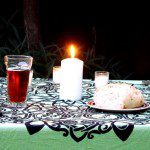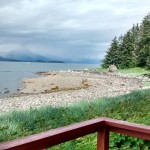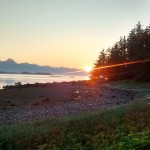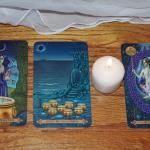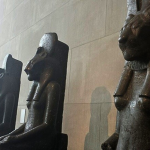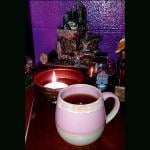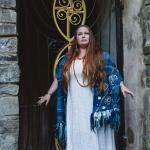Witches, midwives and herbal healers all have some history in common. Throughout history many midwives were also healers, shamans were healers, and many women who worked as midwives or healers might also have been considered witches. Their histories are often woven together.
In modern times, people who are attracted to witchcraft, in my experience, tend be rather independent and willing to learn about anything that attracts their fancy and/or will advance their craft. I never had an interest in herbalism and plants. I love plants, but have never wanted to learn to garden. I am very knowledgable of and interested in food politics and natural food ways, but don’t have any desire to grow my own food. I still don’t. But over the years, as my knowledge has deepened and my family has grown, I’ve come to see how learning about basic herbalism can benefit me, my family, my cooking, and my craft.
With that in mind I signed up for the Dandelion Seed Conference (held two weekends ago at The Evergreen State College in Olympia), put on by the people who run the Herbal Free Clinic in town. Can I just say, how awesome it is that my adopted town has a free clinic that focuses on herbal support?? I think it’s super awesome.
I’m not sure what I was expecting. I thought that I’d be completely clueless, but I was pleasantly surprised to find myself wrong on that assumption! I was completely delighted by the entire event. It was an odd mixture of people who use herbs medicinally, those that use them for intuitive and spiritual purposes, those that use them for food and cooking; crafters, gardeners, teachers, and just plain community members like myself.
I hit up several workshops and one plant walk. The first workshop I attended was led by Feri initiate and traditional herbalist, Sean Donahue. My notes from his talk are basically a reminder to myself to get outside more and to explore some of the plants that I have long loved in the coastal Pacific region: devil’s club, skunk cabbage, and fireweed. He told us the story of Thomas the Rhymer and related it to plant magic, which I found a fresh twist on a tale I hear told quite often in my tradition.
I took a class on joyful aging from a local herbalist. The plant walk was led by an herbalist trained in just about every modality of herbalism possible: Chinese medicine, Ayurveda, medicinal, and traditional herbalism. We talked about a few select plants and spent time with each one, feeling, smelling, tasting – using all of our sense to get acquainted with them. My last workshop was on traditional foodways as a source of healing. I was definitely the choir to the speaker’s preaching!
There were many other workshops, some focused on various aspects of communities that herablists might see in their practice. A two-part workshop on herbs for health and healing in trans* communities seemed particularly interesting. There were workshops on making, crafting, learning, and healing with herbs. Something for everyone! A market filled the hall, and I picked up the most amazing medicinal honey for throats and lungs. Truly the best herbal concoction I’ve ever purchased, as my daughter gets a rattle in her chest with every sniffle. Our pediatrician has given her a steroid inhaler to use at the first sign of a rattle (something to do with warding off asthma in the years to come). This honey, however, managed to that more successfully than the inhaler ever did!
This wasn’t a specifically ‘Pagan’ event. But I certainly expanded my knowledge and found several fantastic local resources for me and my family. I definitely plan to attend next year.





